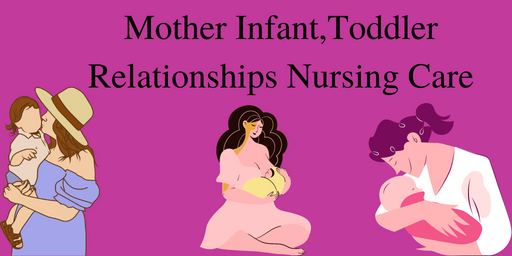The Mother Infant Toddler Relationships Nursing Care. Nurses play a crucial role in fostering positive mother-infant and mother-toddler relationships through supportive care and interventions.
The Mother Infant Toddler Relationships Nursing Care
This includes promoting early interaction, encouraging breastfeeding, providing education, and addressing potential barriers to attachment. Nurses also need to be aware of the developmental stages of both the infant/toddler and the mother, and how those stages can impact the relationship.
What is Mother Infant Toddler Relationships an Introduction
The mother-infant relationship is a critical area of study within nursing care, focusing on the dynamic interactions between mothers and their infants from birth through the toddler years. This relationship is pivotal for both immediate and long-term health outcomes and developmental milestones. Understanding the various factors that contribute to the quality of this relationship is essential for providing effective nursing care and supporting optimal child development.
Mother-Infant/Toddler Relationships
The study of mother-infant and mother-toddler relationships encompasses a wide range of factors influencing the health and development of the child from birth to three years old. This period is crucial as it involves significant physical, cognitive, and emotional growth. The mother-child relationship is a complex system influenced by genetic, biological, environmental, cognitive, and psychological factors (Institute of Medicine, 2000). Understanding this interplay is fundamental for nurses and caregivers to support both maternal and infant health effectively.
Factors Contributing to the Infant-Mother Relationship
Several factors impact the quality of the mother-infant relationship.
- Genetic Factors and Temperament: The infant’s temperament, which includes traits like emotional intensity, adaptability, and sociability, plays a significant role in shaping the mother-infant relationship. Temperament affects how infants react to environmental stimuli and how they regulate their emotions. Infants with difficult temperaments can present challenges for mothers, potentially leading to increased stress and strained interactions (Gross & Conrad, 1995). Conversely, similarities in temperamental traits between mother and child can facilitate smoother interactions and adaptive parenting.
- Biological Factors: Biological aspects, such as birth weight and health complications, also influence the mother-infant relationship. Infants born with low birth weight or medical complications often face developmental challenges that can increase the stress levels of mothers and impact the quality of caregiving (Boyce, Smith, & Casto, 1999). Mothers of these infants might experience heightened caregiving burdens and stress, which can affect their emotional availability and responsiveness.
Study Outcomes
Extensive research has examined the interplay between parenting, environmental factors, and the mother-infant relationship. However, the theoretical understanding of these dynamics is still evolving.
- Parenting and Environmental Influences: Various studies have explored how low-income environments impact parenting and child outcomes. Factors such as lack of support, limited access to resources, and psychological stress can contribute to poorer developmental outcomes in young children (Duncan & Brooks-Gunn, 1997; Mistry et al., 2002). Interventions targeting these environmental risk factors—such as providing psychological support, education, and community resources—are essential for promoting healthy parent-child relationships.
- Complexity of Parenting Environments: The complexity of the parenting environment and its effects on early child development is an area that requires further exploration. Research indicates that understanding how social contexts and environmental factors influence both children and parents is crucial for developing effective interventions (Boyce et al., 1998).
Psychological Factors in the Infant-Mother Relationship
Psychological factors play a significant role in shaping the mother-infant relationship.
- Maternal Mental Health: Maternal stress, depression, and low social support have been identified as significant risks for poor developmental outcomes in infants (Gross, Sambrook, & Fogg, 1999; Petterson & Albers, 2001). Depressed mothers may struggle to respond effectively to their infant’s needs, impacting the quality of interaction and caregiving.
- Bidirectional Effects: Recent research has shifted towards understanding bidirectional effects in the mother-infant relationship. For instance, a mother’s mental health issues can negatively impact her caregiving abilities, while challenging infant behaviors can contribute to maternal stress and depression. This perspective highlights the importance of addressing both the mother and child’s needs in nursing interventions, rather than focusing solely on one side of the dyad.
How Maternal Relations Help in Child Development
Maternal relationships significantly influence child development, and various factors can shape this dynamic.
- Cultural and Ethnic Differences: Research has increasingly focused on how race and ethnicity affect parenting practices and child development. Different cultural values and family structures impact how parents interact with and socialize their children. While a loving and responsive relationship is universally beneficial, the expression of this care can vary across cultures (Garcia Coll et al., 1996; McLloyd et al., 2000).
- Parenting Strategies and Cognitive Influences: Maternal beliefs and cognitive frameworks influence how mothers interpret and respond to their child’s behavior. For instance, cultural beliefs about discipline and childrearing can shape a mother’s approach to managing defiant behaviors in toddlers (Garvey et al., 2000; Goodnow & Collins, 1990). Understanding these cognitive factors is crucial for developing culturally sensitive and effective nursing interventions.
- Integration of Factors: The interplay of temperament, biological factors, parenting environments, and maternal cognition affects the mother-infant relationship. Mothers develop parenting strategies based on their personal characteristics, child-rearing environments, and psychological capacities. Children, in turn, respond to these parenting strategies, creating a dynamic interaction that influences their development (Gross, 1996).
Conclusion
The mother-infant relationship is a multifaceted area of study with significant implications for nursing care and child development. By understanding the various contributing factors—genetic, biological, environmental, psychological, and cultural—nurses can better support mothers and infants in their care. Future research should continue to explore these influences in a holistic manner to develop effective, evidence-based interventions that address the complex needs of both mothers and their children.
Mother Infant Toddler Relationships Nursing Care
Mother Infant Toddler Relationships Nursing Care
Mother Infant Toddler Relationships Nursing Care
Mother Infant Toddler Relationships Nursing Care
Mother Infant Toddler Relationships Nursing Care
Read More:
https://nurseseducator.com/didactic-and-dialectic-teaching-rationale-for-team-based-learning/
https://nurseseducator.com/high-fidelity-simulation-use-in-nursing-education/
First NCLEX Exam Center In Pakistan From Lahore (Mall of Lahore) to the Global Nursing
Categories of Journals: W, X, Y and Z Category Journal In Nursing Education
AI in Healthcare Content Creation: A Double-Edged Sword and Scary
Social Links:
https://www.facebook.com/nurseseducator/
https://www.instagram.com/nurseseducator/
